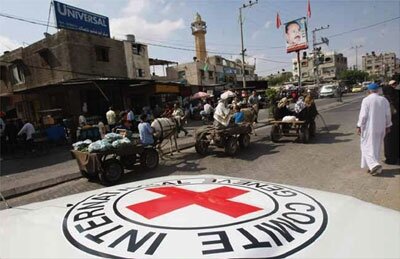Post aus Genf
 Der Report heisst nüchtern:
Der Report heisst nüchtern:
Gaza - 1.5 Million people trapped in despair
Drinn steht, weshalb sechs Monate nach dem Ende der israelischen Gaza- Krieges ein Wiederaufbau des abgeschlossenen Küstenstreifens nicht möglich ist:
Over the last two years, the 1.5 million Palestinians living in the Gaza Strip have been caught up in an unending cycle of deprivation and despair as a result of the conflict, and particularly as a direct consequence of the closure of the crossing points. The ICRC has repeatedly pointed out that Israel’s right to address its legitimate security concerns must be balanced against the right of the population in Gaza to lead a normal and dignified life. Under international humanitarian law, Israel has the obligation to ensure that the population's basic needs in terms of food, shelter, water and medical supplies are met.
Worum’s geht:
The only way to address this crisis is to lift import restrictions on spare parts, water pipes and building materials such as cement and steel so that homes can be rebuilt and vital infrastructure maintained and upgraded.
Gaza's alarming poverty is directly linked to the tight closure imposed on the territory. Local industry and other businesses have to be allowed to rebuild, to import essential inputs and to export their products. But even that would take time. The crisis has become so severe and entrenched that even if all crossings were to open tomorrow it would take years for the economy to recover.
Was kaum nützen wird:
The almost 4.5 billion dollars that donor countries pledged for reconstruction at an international summit in Egypt in March 2009 will be of little use if building materials and other essential items cannot be imported into the Gaza Strip. In any case, reconstruction alone does not offer a sustainable means of getting Gaza back on its feet. To go back to the situation prior to the latest military operation would be unacceptable, as that would only perpetuate Gaza’s plight.
Was zu tun wäre:
The ICRC once again appeals for a lifting of restrictions on the movement of people and goods as the first and most urgent measure to end Gaza's isolation and to allow its people to rebuild their lives.
A lasting solution requires fundamental changes in Israeli policy, such as allowing imports and exports to and from Gaza, increasing the flow of goods and people up to the level of May 2007, allowing farmers to access their to access their land in the de-facto buffer zone and restoring fishermen's access to deeper waters.
Post aus Genf - lohnenswerte Lektüre der Hüter des humanitären Völkerrechts. Und wer's eher mit Bildern hat, der schaue sich das hier an:

Er kam zum Arbeiten. Eigentlich. Martin Lejeune ist ein Journalist des deutschen „Freitag“. Lejeune wollte nach Gaza, zum Arbeiten; Beiträge aus dem abgeriegelten Küstenstreifen für seine Leserschaft schreiben.
Aufgenommen: Okt 05, 18:40
Er kam zum Arbeiten. Eigentlich. Martin Lejeune ist ein Journalist des deutschen „Freitag“. Lejeune wollte nach Gaza, zum Arbeiten; Beiträge aus dem abgeriegelten Küstenstreifen für seine Leserschaft schre
Aufgenommen: Okt 05, 18:45
Bild: Christoph von Toggenburg / ICRC Der Pöstler ist wieder mal vorbeigekommen, der mit den Nachrichten in Sachen humanitärem Völkerrecht. Das Internationale Komitee vom Roten Kreuz IKRK legte seinen Opera
Aufgenommen: Mai 08, 18:36